高中英语狂K语法——句法篇:七、虚拟语气 Word版含解析
高中英语狂K语法——句法篇:七、虚拟语气 Word版含解析

虚拟语气是高考英语必考的语法点,其遍布在听力、阅读、完形、语法填空、写作等各个题型中;语法学习,最重要的就是化繁为简,化繁为简最重要的就是要有条理、要系统。
一起来看看化繁为简的虚拟语气吧!虚拟语气表示说话人的主观愿望、猜测建议或与事实不符的假设。
虚拟语气可分为三种:(1)一般虚拟(2)混合虚拟(3)特殊句式1 一般虚拟的构成:(省略if, 要将should/were/had 提到句首)(1). 对现在的虚拟:If +S.+ did/were sth., S.+ would/could/should +doIf I had time, I would attend the meeting.If I were you, I would seize the chance to go abroad.(2) 对过去的虚拟:If +S.+had + p.p, S.+ would/could/should have + p.pIf you had taken my advice, you would not have failed in the exam.(3) 对将来的虚拟:If + S. + did/were/should do/were to do, S + would/should/could do sth.If you came tomorrow, we would have the meeting.If it were to rain tomorrow, the sports meeting would be put off.If he should not come tomorrow, we should put off the meeting till next day.注意:Had we made good preparations, we might have succeeded.Had it not rained, we would have gone out for a walk.Were I you, I would not do such a thing.2 混合虚拟(1)不同时间的虚拟:If he had listened to me, he would not be in trouble now.If he had told me yesterday, I should know what to do now. xk-w(2) 虚拟与陈述的混合:He could have passed the exam, but he wasn’t careful enough.You should have come earlier, the bus left a moment ago.3 特殊句式(1).suggest, advise, recommend, propose, order, command, request, require, demand + that –clause (should do/do )He suggested that we (should) save money for the future.(insist的判断)(2) It is suggested/advised/ordered/requested/required that –clause(should do/do)(主语从句)(3) My advice/suggestion/request/requirement is that-clause (should do /do) (表语从句)His suggestion/advice/request/requirement that –clause(should do/do ) is.. (同位语从句)(4) It is natural/necessary/strange that-clause (should do/do)表惊奇、怀疑、惋惜、不满、理应如此等。
(完整版)高中虚拟语气用法详解

(完整版)⾼中虚拟语⽓⽤法详解⼀、什么是虚拟语⽓虚拟语⽓是⼀种动词形式,表⽰说话⼈的⼀种愿望,假设,怀疑,猜测,建议等含义,虚拟语⽓所表⽰的含义不是客观存在的事实。
If I were you, I'd take them away. 如果我是你的话,我就会带⾛他们。
(不可能是你,所以这是不存在的事实,所以⽤虚拟语⽓)If I had met Tom, I could have told him. 如果我碰见了Tom ,我就告诉他了。
If I had time, I could come to help you. 如果我有时间,我会来帮助你的。
He suggested that our class should be divided into five groups. 他建议说我们的班应该分成五个⼩组。
He speaks to us as if he had been there. 他给我们讲的好像他去过那⼉。
⼆、虚拟语⽓的⽤法虚拟语⽓在⼀般⽤于简单句,宾语从句,主语从句,表语从句,壮语从句以及同位于从句。
(下⾯我们分别看⼀下)1) 虚拟语⽓⽤在简单句中,表⽰祝愿,命令,它的谓语动词就是原形。
May you be happy. 祝你幸福。
May you have a good time. 祝愿你玩的痛快。
May the friendship between us last long. 祝愿我们的友情天长地久。
Have a good journey! 祝愿你旅途愉快!You go out !你出去!2) 虚拟语⽓⽤在宾语从句中。
在suggest, advise, propose, insist, demand, desire, request, require, decide, order, command 等动词后的宾语从句中,要⽤虚拟语⽓,表⽰建议、要求、决定或命令等,其谓语动词形式为should+ 动词原形,其中should 可以省略,主句中的时态不限。
高中英语之虚拟语气详细讲解
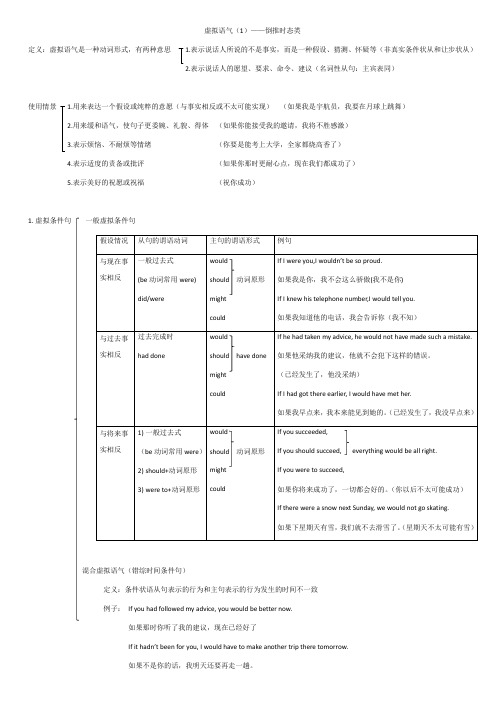
虚拟语气(1)——倒推时态类定义:虚拟语气是一种动词形式,有两种意思 1.表示说话人所说的不是事实,而是一种假设、猜测、怀疑等(非真实条件状从和让步状从)2.表示说话人的愿望、要求、命令、建议(名词性从句:主宾表同)使用情景 1.用来表达一个假设或纯粹的意愿(与事实相反或不太可能实现)(如果我是宇航员,我要在月球上跳舞)2.用来缓和语气,使句子更委婉、礼貌、得体(如果你能接受我的邀请,我将不胜感激)3.表示烦恼、不耐烦等情绪(你要是能考上大学,全家都烧高香了)4.表示适度的责备或批评(如果你那时更耐心点,现在我们都成功了)5.表示美好的祝愿或祝福(祝你成功)1.虚拟条件句一般虚拟条件句混合虚拟语气(错综时间条件句)定义:条件状语从句表示的行为和主句表示的行为发生的时间不一致例子:If you had followed my advice, you would be better now.如果那时你听了我的建议,现在已经好了If it hadn’t been for you, I would have to make another trip there tomorrow.如果不是你的话,我明天还要再走一趟。
If you had studied hard before,you would be a college student now.如果你以前努力学习的话,你现在就是大学生了。
省略+倒装当虚拟条件句的谓语动词中含有were,should,had时,if可以省略,并将were,should,had提前于句首,变为倒装句。
如果虚拟条件句是否定句,not 保留在原处If he should agree to go there, we should send him there.= Should he agree to go there,we should send him there.If she were there,she would agree with us.= Were she were, she would agree with us.If he had learnt about computers,we would have hired him.= Had he learnt about computers,we would have hired him.含蓄虚拟条件句定义:有时为了表达的需要,在虚拟语气中并不总是出现if引导的条件状语从句,而是通过其他手段来代替条件从句分类:1) but for....=(If it+be not for) ;without;Without your help ,we couldn’t have finished the work ahead of time.= But for your help,we couldn’t have finished the work ahead of time.= If it hadn’t been for your help,we couldn’t have finished the work ahead of time.没有你的帮助,我们不可能完成任务。
高中英语知识点归纳虚拟语气的用法与句型
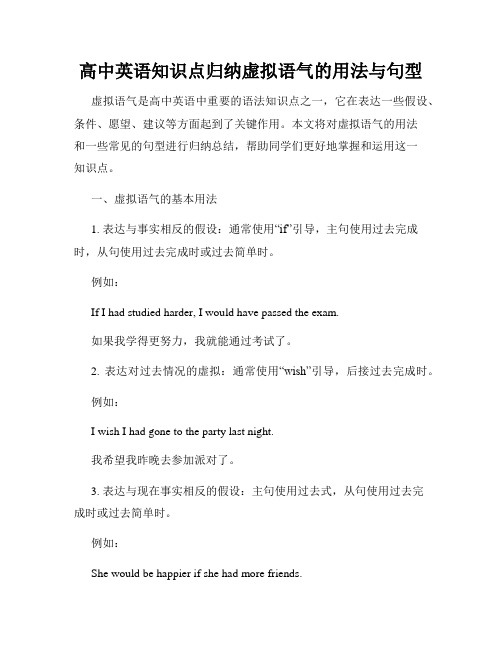
高中英语知识点归纳虚拟语气的用法与句型虚拟语气是高中英语中重要的语法知识点之一,它在表达一些假设、条件、愿望、建议等方面起到了关键作用。
本文将对虚拟语气的用法和一些常见的句型进行归纳总结,帮助同学们更好地掌握和运用这一知识点。
一、虚拟语气的基本用法1. 表达与事实相反的假设:通常使用“if”引导,主句使用过去完成时,从句使用过去完成时或过去简单时。
例如:If I had studied harder, I would have passed the exam.如果我学得更努力,我就能通过考试了。
2. 表达对过去情况的虚拟:通常使用“wish”引导,后接过去完成时。
例如:I wish I had gone to the party last night.我希望我昨晚去参加派对了。
3. 表达与现在事实相反的假设:主句使用过去式,从句使用过去完成时或过去简单时。
例如:She would be happier if she had more friends.如果她有更多朋友,她会更开心。
4. 表达对现在情况的虚拟:通常使用“wish”引导,后接过去时。
例如:I wish I were a bird and could fly in the sky.我希望我是一只鸟,可以在天空中飞翔。
5. 表达对将来的不可能或不太可能的情况:主句使用过去式,从句使用过去完成时。
例如:If I were you, I would not go to that dangerous place.如果我是你,我不会去那个危险的地方。
二、常见虚拟语气句型1. 虚拟语气与建议:It is important (necessary, advisable, essential, etc.) that + 主语 + (should) + 动词原形例如:It is necessary that you (should) finish your homework before playing games.你在玩游戏前完成作业是必要的。
高中必备知识点解析虚拟语气的形式与用法

高中必备知识点解析虚拟语气的形式与用法虚拟语气是高中英语必备的语法知识点之一。
它在英语中经常被用于表达假设、愿望、建议、命令和推测等情态,通过使用虚拟语气,可以使语言更加丰富和准确。
本文将深入解析虚拟语气的形式与用法。
一、虚拟语气的形式1. 虚拟语气的一般现在时:用于表示与现在事实相反的情况。
其结构为:主语+动词原形(倒装)。
例如:If I were you, I would study harder.(如果我是你,我会更加努力学习。
)2. 虚拟语气的一般过去时:用于表示与过去事实相反的情况。
其结构为:主语+动词过去式(倒装)。
例如:If I had seen her yesterday, I would have said hello.(如果我昨天见到她,我会问好的。
)3. 虚拟语气的过去完成时:用于表示对过去情况的猜测或不可能发生的情况。
其结构为:主语+动词过去完成式(倒装)。
例如:I wish I had studied harder for the exam.(我希望我为考试努力学习。
)二、虚拟语气的用法1. 表达假设与条件:If I were you, I would travel around the world.(如果我是你,我会环游世界。
)I wish I had a million dollars.(我希望我有一百万美元。
)2. 表达愿望与建议:I wish you would stop smoking.(我希望你戒烟。
)It's important that she arrive on time.(她按时到达很重要。
)3. 表达命令与要求:The teacher ordered that the students be quiet.(老师要求学生们保持安静。
)She insisted that he leave immediately.(她坚持要他立刻离开。
)4. 表达推测与猜测:He looks as if he were sick.(他看起来像是生病了。
高中虚拟语气用法解析
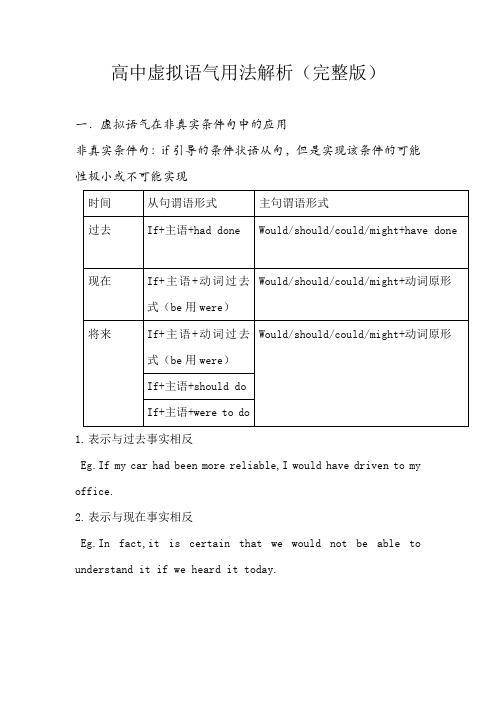
高中虚拟语气用法解析(完整版)一.虚拟语气在非真实条件句中的应用非真实条件句:if引导的条件状语从句,但是实现该条件的可能性极小或不可能实现1.表示与过去事实相反Eg.If my car had been more reliable,I would have driven to my office.2.表示与现在事实相反Eg.In fact,it is certain that we would not be able to understand it if we heard it today.3.表示与将来事实相反Eg.If you succeed,everything would be all right.Grace doesn't want to move to New York because she thinks if she were to live there,she wouldn't be able to see her parents.4.注意事项(1)W as不可以替代were,虚拟语气中,从句中be动词只有were(2)错综时间条件句:条件句的行为和主句行为发生的时间不一致,动词的形式按照主句和从句各自的时间调整。
Eg.If he had listened to me, he would not be in such trouble now. If it had not been raining too much, the crops would be growing much better.(3)虚拟条件句中的谓语动词含有were/ should /had 时,if可省略,而将were/ should /had 置于主语前面Eg.What would have happened had Bob walked farther as far as the river bank?Should he agree to go there, we should send him there. Were it Sunday tomorrow, we should go to the great wall.两个固定搭配:①Were it not for 要不是...就②Had it not been for 要不是...就If it were not for (Were it not for)the bad weather now, we would go to the park to fly kites.If it had not been for(Had it not been for) the bad weather yesterday, we would have gone to the park to fly kites. (4)含蓄虚拟条件句:有时假设的情况不是以if条件句来表示。
高中语法解析虚拟语气
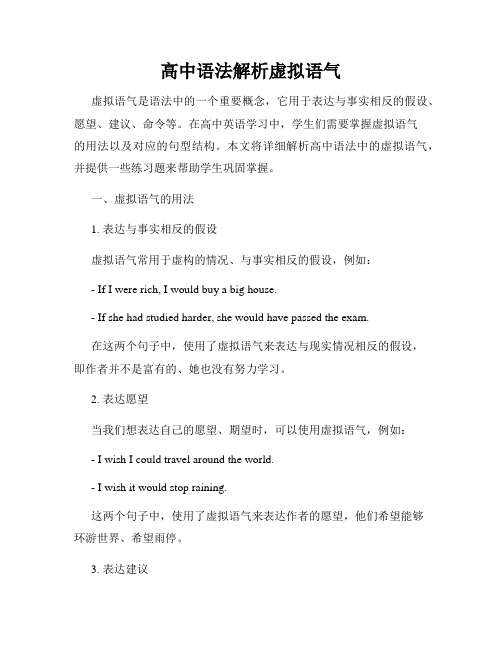
高中语法解析虚拟语气虚拟语气是语法中的一个重要概念,它用于表达与事实相反的假设、愿望、建议、命令等。
在高中英语学习中,学生们需要掌握虚拟语气的用法以及对应的句型结构。
本文将详细解析高中语法中的虚拟语气,并提供一些练习题来帮助学生巩固掌握。
一、虚拟语气的用法1. 表达与事实相反的假设虚拟语气常用于虚构的情况、与事实相反的假设,例如:- If I were rich, I would buy a big house.- If she had studied harder, she would have passed the exam.在这两个句子中,使用了虚拟语气来表达与现实情况相反的假设,即作者并不是富有的、她也没有努力学习。
2. 表达愿望当我们想表达自己的愿望、期望时,可以使用虚拟语气,例如:- I wish I could travel around the world.- I wish it would stop raining.这两个句子中,使用了虚拟语气来表达作者的愿望,他们希望能够环游世界、希望雨停。
3. 表达建议在给予他人建议时,也可以使用虚拟语气,例如:- I suggest that he go to the doctor.- It is recommended that she take a break.这两个句子中,使用了虚拟语气来表达建议,作者建议他去看医生、建议她休息一下。
4. 表达命令或要求虚拟语气还可以用于表达命令、要求等,例如:- The teacher insisted that the students be on time.- The boss demanded that the work be completed by Friday.这两个句子中,使用了虚拟语气来表达命令、要求,老师坚持要求学生准时、老板要求工作在周五之前完成。
二、虚拟语气的句型结构1. 谓语动词在虚拟语气中的形式变化在虚拟语气的句子中,谓语动词的形式会发生变化。
虚拟语气详细讲解及经典习题 附答案
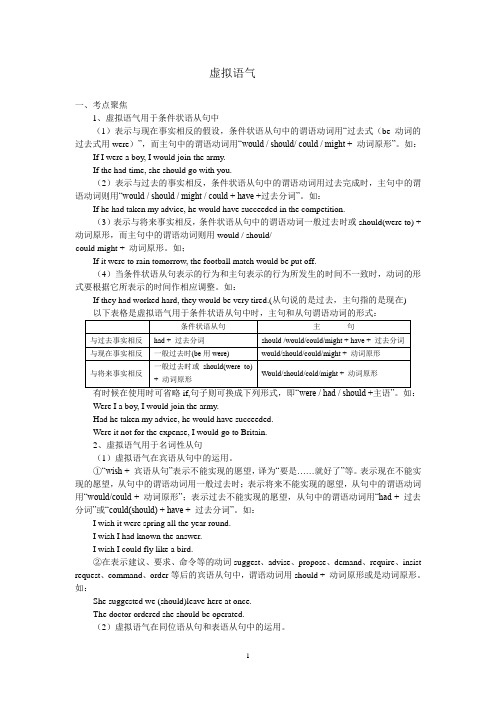
虚拟语气一、考点聚焦1、虚拟语气用于条件状语从句中(1)表示与现在事实相反的假设,条件状语从句中的谓语动词用“过去式(be动词的过去式用were)”,而主句中的谓语动词用“would / should/ could / might + 动词原形”。
如:If I were a boy, I would join the army.If the had time, she should go with you.(2)表示与过去的事实相反,条件状语从句中的谓语动词用过去完成时,主句中的谓语动词则用“would / should / might / could + have +过去分词”。
如:If he had taken my advice, he would have succeeded in the competition.(3)表示与将来事实相反,条件状语从句中的谓语动词一般过去时或should(were to) + 动词原形,而主句中的谓语动词则用would / should/could might + 动词原形。
如;If it were to rain tomorrow, the football match would be put off.(4)当条件状语从句表示的行为和主句表示的行为所发生的时间不一致时,动词的形式要根据它所表示的时间作相应调整。
如:If they had worked hard, they would be very tired.(从句说的是过去,主句指的是现在)Were I a boy, I would join the army.Had he taken my advice, he would have succeeded.Were it not for the expense, I would go to Britain.2、虚拟语气用于名词性从句(1)虚拟语气在宾语从句中的运用。
高中英语虚拟语气讲解及练习附答案解析
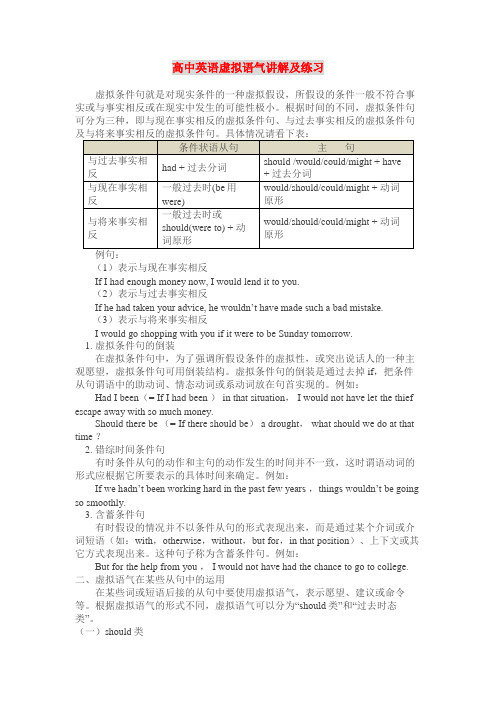
高中英语虚拟语气讲解及练习虚拟条件句就是对现实条件的一种虚拟假设,所假设的条件一般不符合事实或与事实相反或在现实中发生的可能性极小。
根据时间的不同,虚拟条件句可分为三种,即与现在事实相反的虚拟条件句、与过去事实相反的虚拟条件句(1)表示与现在事实相反If I had enough money now, I would lend it to you.(2)表示与过去事实相反If he had taken your advice, he wouldn’t have made such a bad mistake.(3)表示与将来事实相反I would go shopping with you if it were to be Sunday tomorrow.1. 虚拟条件句的倒装在虚拟条件句中,为了强调所假设条件的虚拟性,或突出说话人的一种主观愿望,虚拟条件句可用倒装结构。
虚拟条件句的倒装是通过去掉if,把条件从句谓语中的助动词、情态动词或系动词放在句首实现的。
例如:Had I been(= If I had been ) in that situation, I would not have let the thief escape away with so much money.Should there be (= If there should be) a drought, what should we do at that time ?2. 错综时间条件句有时条件从句的动作和主句的动作发生的时间并不一致,这时谓语动词的形式应根据它所要表示的具体时间来确定。
例如:If we hadn’t been working hard in the past few years ,thing s wouldn’t be going so smoothly.3. 含蓄条件句有时假设的情况并不以条件从句的形式表现出来,而是通过某个介词或介词短语(如:with,otherwise,without,but for,in that position)、上下文或其它方式表现出来。
专题06 虚拟语气陷阱题高中英语语法易错题通关秘籍 Word版含解析

第一部分:理论知识高中英语语法精讲第三章虚拟语气虚拟语气(the subjunctive mood),又称假设语气,是谓语动词的一种形式,表示说话人叙述的内容与事实相反,在现实中并不存在,或实现的可能性很小。
一、动词的语气语气用来区别讲话人对某一行为或事情的看法和态度。
英语中的语气(mood)有三种,分别是陈述语气、祈使语气和虚拟语气。
1.陈述语气陈述语气一般用来叙述事实或就事实提出询问,主要用于陈述句、疑问句和某些感叹句。
Where there is a will, there's a way.有志者事竟成。
Can you help me carry the box upstairs你能帮我把箱子搬到楼上吗?How I missed the life in the countryside! 我多么想念乡村的生活啊!2.祈使语气祈使语气表示说话人向对方提出请求或下达命令。
Come this way, please! 请这边走。
Don't make any noise, will you别吵,行吗?Do be careful when crossing the street.过马路时一定要小心。
3.虚拟语气虚拟语气表示动作或状态不是客观存在的事实,而是说话人的主观愿望、假设或推测等。
If I were a bird, I could fly in the air.如果我是一只小鸟,我就能在空中飞行。
I wish it were spring all the year round.但愿四季如春。
May good luck be yours! 祝你好运!二、条件句中的虚拟语气英语中条件从句有两类,一类是真实条件句,另一类是非真实条件句。
如果假设的情况可能发生,是真实条件句;如果假设的情况是不存在的或不大可能发生的,则是虚拟条件句。
A.真实条件句真实条件句表示的假设是可能发生或实现的,主句和从句的谓语动词都要用陈述语气。
高考英语语法——虚拟语气

虚拟语气一、定义:虚拟语气表示动作或状态与事实相反,或不可能发生的情况。
1.虚拟语气用于条件状语从句中1)表示与现在事实相反或不可能发生:一般过去时(虚拟语气中be→were)Eg. If he had time, he would (could, might) go with youEg.If I were you, I would work hard.2)表示与过去事实相反或不可能发生Eg.If I had time last night, I should have come to see you.Eg.If they had helped us, we would have finished the task. (实际上没帮)3)表示与将来的事实可能相反或不可能发生Eg.If it should rain, the crops would be saved.Eg.If it were to snow tomorrow, they would not go out.4)※注意:虚拟语气的倒装语序:如果if从句里含有should, had, were或其他助动词,则可将从属连词if省去,将助动词.情态动词.be或have放在句首形成部分倒装.Eg.If I had time, I would have done that yesterday.=Had I had time, I would have done that yesterday.Eg.If I were you, I would go to the party.=Were I you, I would go to the party.Eg.If it should rain tomorrow, I would stay at home=Should it rain tomorrow, I would stay at home.2. 虚拟语气在宾语从句中的用法在动词wish后的宾语从句中,表示与现在或过去的事实相反,或对将来的主观愿望,从句通常省略连词that。
(完整word版)高中英语语法虚拟语气讲解(word文档良心出品)

高中英语语法讲解--虚拟语气1. 语气的定义和种类(1)语气的定义语气是动词的一种形式,它表示说话人对某一行为或事情的看法和态度。
(2)语气的种类A. 陈述语气表示动作或状态是现实的、确定的或符合事实的,用于陈述句、疑问句和某些感叹句。
We are not ready.Did it rain all day yesterday?What a fine day today!B. 祈使语气表使说话人的建议、请求、邀请、命令等。
Be careful.Don’t forget to clo se the window.Open the door, please.C. 虚拟语气表使动作或状态不是客观存在的事实,而是说话人的主观愿望、假设或推测等。
2. 虚拟语气一. 虚拟语气在条件句中的应用学习虚拟语气在条件句中的用法之前我们必须清楚条件句的种类:条件句有真实条件句与非真实条件句(或称虚拟条件句)两种。
真实条件句所表的假设是可能发生或实现的,句中的条件从句与结果主句都用陈述语气。
如:If it doesn’t rain tomorrow, I will go for a picnic. 假若明天不下雨,我就去野餐。
Oil floats if you pour it on water. 你如把油倒在水里,油就浮起来。
虚拟条件句所表的假设则是不可能或不大可能发生或实现的,句中的条件从句与结果主句皆须用虚拟语气。
条件从句主句与现在事实相违背过去式(动词是be用were)should / would/could/might + 动词原形与过去事实相违背had + 过去分词should / would/could/might + have +过去分词与未来事实相违背1) should + 动词原形2) were + 动词不定式3) 过去式(动词是Be也可以用were)should / would/could/might + 动词原形1. 与现在事实相反的虚拟条件句,条件从句的谓语用动词的过去式(be的过去式用were), 主句的谓语用should (would, might,could)+动词原形。
高中语法专题解析虚拟语气

高中语法专题解析虚拟语气虚拟语气(Subjunctive Mood)是英语中一种特殊的语气,用于表示假设、愿望、建议、要求、命令等虚拟的情况或假设。
在高中语法学习中,掌握虚拟语气的用法是十分重要的。
本文将针对高中语法专题解析虚拟语气进行详细讲解。
一、条件虚拟语气条件虚拟语气用于表示与现实相反的假设情况,包括对现在和将来的假设。
其主要形式为:if + 条件从句 (Past Simple), 主句(would/could/might + 动词原形),例如:1. If I were a bird, I would fly in the sky freely.(如果我是一只鸟,我就可以在天空中自由飞翔。
)2. If it rained tomorrow, we would stay at home.(如果明天下雨,我们会呆在家里。
)需要注意的是,条件从句中的动词通常使用过去式形式,而主句中的动词则使用情态动词 would/could/might + 动词原形的形式。
二、虚拟语气用于表达愿望、建议、要求1. 表达愿望虚拟语气可以用于表达对现在或将来情况的愿望,常见的句型有:- I wish/If only + 主语 + 过去式:用于表达对现在情况的不满或遗憾的愿望,例如:"I wish I were taller."(我希望我个子高一些。
)- I wish/If only + 主语 + would/could/过去式:用于表达对现在情况的希望或期望,例如:"I wish you would come to my party."(我希望你能来参加我的派对。
)2. 表达建议虚拟语气可以用于表达对过去情况的建议,常见的句型有:- It's time/It's high time + 主语 + 过去式:用于表示现在情况应该采取的行动,例如:"It's time you finished your homework."(你该完成作业了。
高中英语虚拟语气语法讲解
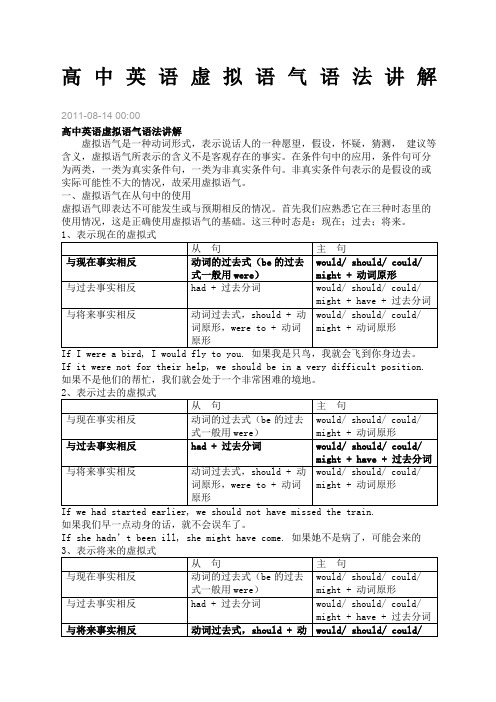
高中英语虚拟语气语法讲解2011-08-14 00:00高中英语虚拟语气语法讲解虚拟语气是一种动词形式,表示说话人的一种愿望,假设,怀疑,猜测,建议等含义,虚拟语气所表示的含义不是客观存在的事实。
在条件句中的应用,条件句可分为两类,一类为真实条件句,一类为非真实条件句。
非真实条件句表示的是假设的或实际可能性不大的情况,故采用虚拟语气。
一、虚拟语气在从句中的使用虚拟语气即表达不可能发生或与预期相反的情况。
首先我们应熟悉它在三种时态里的使用情况,这是正确使用虚拟语气的基础。
这三种时态是:现在;过去;将来。
If it were not for their help, we should be in a very difficult position. 如果不是他们的帮忙,我们就会处于一个非常困难的境地。
如果我们早一点动身的话,就不会误车了。
If she hadn’t been ill, she might have come. 如果她不是病了,可能会来的questions.如果李教授明天有空的话,我们可以问他点问题。
If there should be no air, there would be no living things.如果没有空气,就不会有生物。
二、错综时间的虚拟句通常情况下,在非真实条件句中主句和从句的谓语动词所指时间是一致的, 但有时也可能指不同的时间,这时要根据上下文的意思采用不同的谓语动词形式.If I were you, I would have taken his advice. (从句指现在, 主句指过去)。
换成我是你,我就会听从他的建议。
If I had taken my raincoat with me this morning, I would not be wet now. (从句指过去,主句指现在)。
如果我今天早上带了雨衣,现在就不会被淋湿了。
If we hadn’t been working hard in the past few years, things wouldn’t be going so smoothly.(从句指过去,主句指现在)。
高中英语知识点归纳虚拟语气的构成和用法
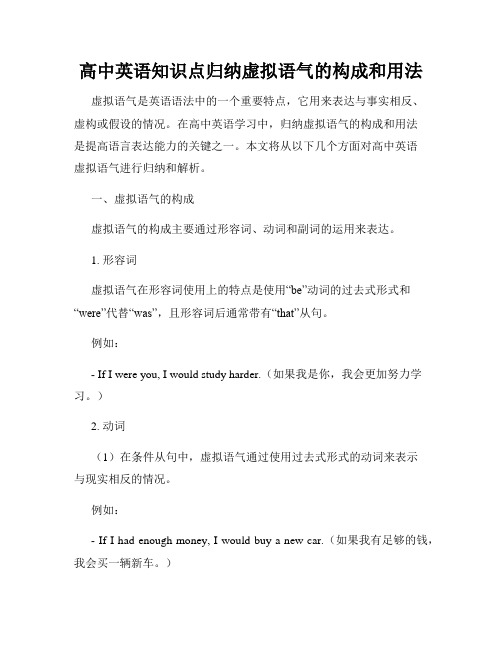
高中英语知识点归纳虚拟语气的构成和用法虚拟语气是英语语法中的一个重要特点,它用来表达与事实相反、虚构或假设的情况。
在高中英语学习中,归纳虚拟语气的构成和用法是提高语言表达能力的关键之一。
本文将从以下几个方面对高中英语虚拟语气进行归纳和解析。
一、虚拟语气的构成虚拟语气的构成主要通过形容词、动词和副词的运用来表达。
1. 形容词虚拟语气在形容词使用上的特点是使用“be”动词的过去式形式和“were”代替“was”,且形容词后通常带有“that”从句。
例如:- If I were you, I would study harder.(如果我是你,我会更加努力学习。
)2. 动词(1)在条件从句中,虚拟语气通过使用过去式形式的动词来表示与现实相反的情况。
例如:- If I had enough money, I would buy a new car.(如果我有足够的钱,我会买一辆新车。
)(2)在建议、要求和命令中,虚拟语气通过使用原形动词的“should”、“would”、“might”等形式来表示假设、建议或虚拟的情况。
例如:- I suggest that he should take a break.(我建议他休息一下。
)- They demanded that he apologize to them.(他们要求他向他们道歉。
)- I wish you would stop talking.(我希望你能停止说话。
)3. 副词虚拟语气通常通过在句子中使用“as if”、“if only”等副词来表示与现实情况相反的假设。
例如:- He talks as if he were the boss.(他说话的口气好像自己是老板。
)- If only I could travel around the world.(要是我能环游世界就好了。
)二、虚拟语气的用法虚拟语气在高中英语中的用法主要包括以下几种情况。
- 1、下载文档前请自行甄别文档内容的完整性,平台不提供额外的编辑、内容补充、找答案等附加服务。
- 2、"仅部分预览"的文档,不可在线预览部分如存在完整性等问题,可反馈申请退款(可完整预览的文档不适用该条件!)。
- 3、如文档侵犯您的权益,请联系客服反馈,我们会尽快为您处理(人工客服工作时间:9:00-18:30)。
虚拟语气是高考英语必考的语法点,其遍布在听力、阅读、完形、语法填空、写作等各个题型中;语法学习,最重要的就是化繁为简,化繁为简最重要的就是要有条理、要系统。
一起来看看化繁为简的虚拟语气吧!虚拟语气表示说话人的主观愿望、猜测建议或与事实不符的假设。
虚拟语气可分为三种:(1)一般虚拟(2)混合虚拟(3)特殊句式1 一般虚拟的构成:(省略if, 要将should/were/had 提到句首)(1). 对现在的虚拟:If +S.+ did/were sth., S.+ would/could/should +doIf I had time, I would attend the meeting.If I were you, I would seize the chance to go abroad.(2) 对过去的虚拟:If +S.+had + p.p, S.+ would/could/should have + p.pIf you had taken my advice, you would not have failed in the exam.(3) 对将来的虚拟:If + S. + did/were/should do/were to do, S + would/should/could do sth.If you came tomorrow, we would have the meeting.If it were to rain tomorrow, the sports meeting would be put off.If he should not come tomorrow, we should put off the meeting till next day.注意:Had we made good preparations, we might have succeeded.Had it not rained, we would have gone out for a walk.Were I you, I would not do such a thing.2 混合虚拟(1)不同时间的虚拟:If he had listened to me, he would not be in trouble now.If he had told me yesterday, I should know what to do now. xk-w(2) 虚拟与陈述的混合:He could have passed the exam, but he wasn’t careful enough.You should have come earlier, the bus left a moment ago.3 特殊句式(1).suggest, advise, recommend, propose, order, command, request, require, demand + that –clause (should do/do )He suggested that we (should) save money for the future.(insist的判断)(2) It is suggested/advised/ordered/requested/required that –clause(should do/do)(主语从句)(3) My advice/suggestion/request/requirement is that-clause (should do /do) (表语从句)His suggestion/advice/request/requirement that –clause(should do/do ) is.. (同位语从句)(4) It is natural/necessary/strange that-clause (should do/do)表惊奇、怀疑、惋惜、不满、理应如此等。
It’s strange that he should ha ve missed the train. (表竟然)It is important that we should learn from others.(表理应如此)It is a pity that he should not go with us.(表惊讶、不满)(5)wish + that clause (did/were 与现在相反)wish + that clause (would/could/might + do与将来相反)wish + that clause ( had done 与过去相反)I wish I could go with them tomorrow.I wish I had never met him.(6) It is (high/about) time + clause (did, should do )It is (high/about) time we went home.(7) would rather + clause (did 与现在或将来相反);(had done 与过去相反)I would rather you came tomorrow. I would rather you hadn’t told her the news.(8) If only + clause ( did/were与现在相反) ((would/could/might + do与将来相反)( had done 与过去相反) “要是。
就好了“If only he would come tomorrow! If only I had taken her advice!If only I were ten years younger!(9) as if + clause (did/were 与现在相反) (would/could/might + do与将来相反)( had done 与过去相反)She treats Kate as if she were her own daughter.They talked as if they had been friends for years.(10) would like/was/were to have done somethingI would like to have attended the party, but one of my friends came to see me.(11) without/but for + n.= if it were not for +n./if it hadn’t been for + n. (otherwise后从句同)I would not have passed the exam without your help.(=if it hadn’t been for your help)4 虚拟语气在各种从句中的用法虚拟语气除主要用于非真实条件句外,还可用在部分主语从句、宾语从句、表语从句、同位语从句、定语从句和状语从句之中。
A.名词性从句中的虚拟语气主句中的动词、名词、形容词如表示要求、建议、命令或愿望等含义,与其相关的名词性从句(主语从句、宾语从句、表语从句和同位语从句)中的谓语动词要用虚拟语气。
1.主语从句中的虚拟语气主语从句通常用于“It is + 形容词名词动词的-ed形式 + that ...”结构。
主语从句中是否用虚拟语气取决于所用的形容词或动词的-ed形式,其谓语动词常用“should + 动词原形”(美国英语常省略should,只用动词原形)。
①表示建议或命令It is important that we (should) work out a study plan. 重要的是我们要制订出一个学习计划。
It will be better that we (should) meet some other time. 最好我们在另一个时间见面。
It is suggested that each student (should) sing a song in English. 有人建议每个学生都要唱一首英文歌曲。
It is demanded that he should leave at once. 要求他立刻离开。
②表示惊讶It is strange that he should have failed to see his own shortcomings. 真奇怪他竟看不到自己的缺点。
It is a pityshame that I should be at school instead of lying here in hospital. 真可惜,我应当在学校而不是躺在医院里。
It is natural that you should forget it first. 你起先记不住是很自然的。
xk.w必背:常见的要接含有虚拟语气主语从句的词形容词:important, necessary, urgent, essential, vital, natural, strange, proper等动词的-ed形式:arranged, suggested, ordered, required, desired, demanded, proposed等It is necessary that the program (should) be loaded into the computer. 有必要把程序输入电脑。
It is strange that he should have learned so much in such a short time. 很奇怪他竟然在如此短的时间内学了那么多的东西。
It is desired that we (should) get everything ready by tonight. 希望一切在今晚前准备就绪。
2.宾语从句虚拟语气常用在表示要求、建议、命令或愿望的动词后的宾语从句中。
常见的宾语从句中需用“should+动词原形”的动词有:一个坚持:insist两个命令:order,command三个建议:suggest,advise,propose四个要求:demand,require,ask,desire①在suggest(建议), order(命令), propose(建议), insist(坚持要做), command (命令),request (要求),advise(建议)等动词后的宾语从句中,谓语动词用 should + 动词原形(美国英语常省略should)。
